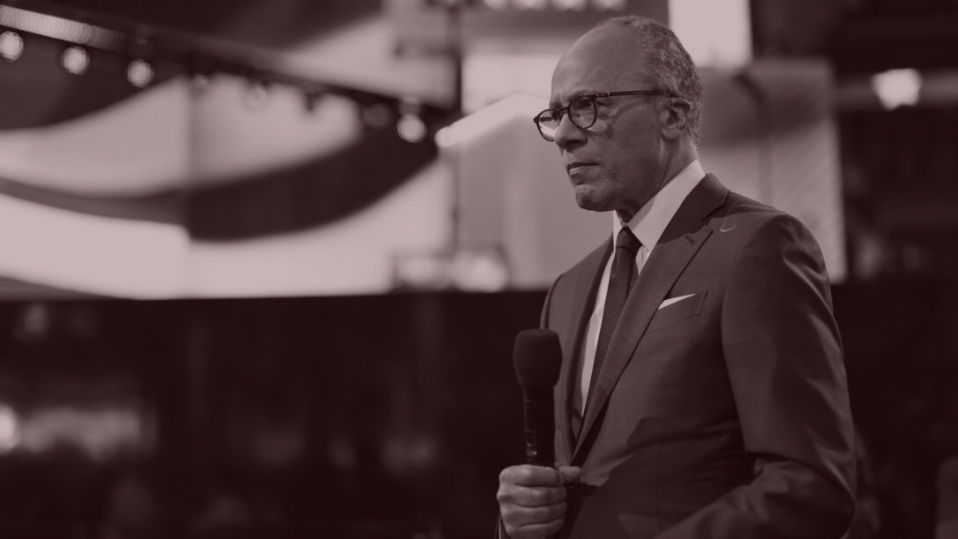 |
 |
|
Greetings from Los Angeles. In tonight’s email, news and notes on the real Norah O’Donnell news—and the coming talent exodus as news networks cut costs in anticipation of new economic realities.
But first…
🤸 P.R. gold: Last night, for the fifth or sixth time since the Opening Ceremony on the Seine, I found myself welling up in front of the television; in this case, I was moved by Simone Biles and her teammates’ gold medal in the women’s overall gymnastics competition. My usual stoicism is no match for NBC’s slickly produced coverage of these games and their storylines—all of which are now available to me, thanks to Peacock—and so despite never watching swimming or surfing or archery (I’m particularly enamored with archery this year, go figure), I somehow find myself gripped by the screen this summer, holding my breath, feeling quietly patriotic, and keenly aware of the power of NBC’s best-in-class production.
I love the Olympics, but I’m also a bit baffled by an emerging media-P.R. narrative that has cast these games as an overwhelming financial success for NBC and a sign of life for the larger linear television industry. In recent days, the trades have trumpeted huge audiences and advertising records for the network without really looking under the hood. CNN’s Oliver Darcy on Tuesday reported that NBC’s $1.25 billion in ad sales is “sending record profits to the media conglomerate’s coffers.”
Recall that NBC, which spent $7.6 billion for the rights to broadcast the games through 2032, is on the hook for 1,200 employees, 150-plus commentators, and 250,000 feet of fiber cables, and another 1,800 staffers and the 115,000-square-foot “sports integration facility and warehouse” broadcast center back in Connecticut. The cumulative audience numbers that NBC is touting, while inarguably very impressive, are at least an open question. If you cume 7,000 hours of linear and digital coverage and 5,000+ hours of streaming and 17 consecutive nights of primetime, and all 329 medal events, across all platforms, you will invariably get a very big number, but that’s an apples-to-oranges comparison with the numbers for a single broadcast.
Mark Marshall, NBCUniversal’s global advertising chairman, has said the Paris Games have “delivered a uniquely powerful halo for brands at an incredible scale with a highly engaged and passionate audience,” which is also inarguably true. But this “halo” seems less correlated to profit than the justification of the record-high investment costs. And while there is no doubt that all the exposure to Peacock will fuel growth down the line, this isn’t quite on par with a $125 million playoff game or even broadcasting the NBA for $2.5 billion per year.
I’m not trying to be a downer here. Indeed, all conversations about success in television are usually formulated in a yes, but… manner that acknowledges the rise of cord-cutting, the reality that streaming is a less reliable and profitable model than cable, and the reckoning that monocultural moments (even the Olympics!) are more complicated to monetize in a multichannel world. I presume there are proprietary accounting measurements that will allow NBCU Chairman Mark Lazarus to claim that these games are profitable—not record-setting, but technically profitable, and certainly a boon to Peacock and Comcast overall. “Standard entertainment accounting,” one veteran media executive observed regarding the P.R. blitz. “Tell the best story you can tell, and someone else will have to pay the bill down the road, when someone else has the job. Just like the gymnastics floor exercise, there is a meticulously choreographed routine to Olympic P.R. that involves leaps, flips and some grimacing contortions… But the long tail math is fuzzy and even misleading.”
|
|
A MESSAGE FROM OUR SPONSOR
|
 |
| The electric SUV that drives like a sports car. Polestar 3. Sleek design, responsive handling, & luxurious interior with 25 speakers, 3D Bowers & Wilkins, and Google built-in. Up to 315 miles of range (EPA). Polestar 3 is designed with meticulous attention to detail, so every time you drive, it can be the best time of your day. Be among the first to experience Polestar 3. Schedule your test drive today. |
|
|
|
🇺🇸 Sugar high in July: Back on the home front, news networks are touting record-setting ratings and audience numbers for the month of July, fueled by Biden’s disastrous debate, the Trump assassination attempt, the Republican National Convention, and the president’s historic decision to step aside and make way for Kamala Harris, who is driving a surge of enthusiasm on the left. Undeniably, the biggest winner among the TV networks is Fox News, which was, by its own account, “the most watched network in all of television in weekday primetime, outpacing not only all of cable but the competition on broadcast networks ABC, CBS, and NBC.” At the Washington Post, C.E.O. Will Lewis recently sent an email to staff touting “a blockbuster week in terms of audience,” with “six of the top ten days for readership and engagement so far this year.”
Of course, as I noted last week while presaging these press releases, this surge is ephemeral and meaningless—and frankly, though I do believe in the power of positive reinforcement, counterproductive—unless those audiences are actively being converted into loyal and engaged (and ideally paying) customers. As with the Olympics, the momentary audience surge around a particularly heady month in U.S. politics does not negate the broader trend. The challenge for every news organization experiencing such momentum is to leverage it into sustained growth, the way TheNew York Times did in the previous decade—and then, in some cases, turn that engagement into a self-sustaining and enduring business model. Morale is important, but it’s also a fleeting emotion.
🇬🇧 Brown vs. Lewis: Gordon Brown, the former British prime minister who has had a long-running feud with Washington Post publisher Will Lewis pertaining to the parliamentary expenses scandal that Lewis oversaw at the Telegraph, says he has asked Scotland Yard to investigate whether Lewis obstructed justice while helping Rupert Murdoch clean up his phone-hacking scandal. Brown claims the Metropolitan police’s “special inquiry team” has told him they “will look into this further.” This doesn’t entirely seem like the formal “criminal investigation” Brown had called for—though some are interpreting it that way—but rather a new look at whether the case should be reopened. In any event, a lot for Cameron Barr to chew on up there in North Yorkshire.
And now, to the main event…
|
 |
| Anchors Away |
| News and notes on the future of broadcast news amid the O’Donnell pivot and other industry murmurs. |
|
|
|
| On Tuesday, as Norah O’Donnell was walking me through her surprise decision to step down from CBS Evening News in pursuit of more cross-platform and hopefully zeitgeist-inducing Pope Francis-style interview specials, it occurred to me that the delicate choreography surrounding her career shift—the emphasis on her new Barbara Walters–ish incarnation, the de-emphasis on the future of the Evening News, even the offer to give me an exclusive interview—belied the real upheaval actually taking place at one of America’s most storied journalistic institutions. As I reported on Tuesday, CBS Evening News is now likely to transition to an ensemble cast of rotating anchors behind the desk, ironically making the House of Cronkite the first network to relinquish the half-century-plus format of a singular, expensive anchor in the chair. (For the record, CBS News has not said or confirmed this, but… well, this is why you pay for Puck).
Such a transition was inevitable, given the secular decline of linear television and broadcast news and the cost cutting it all entails. O’Donnell and her fellow nightly news anchors make very healthy seven-figure salaries, though in the case of David Muir at ABC’s top-rated World News Tonight, it’s likely even more. These salaries are incongruous with the new economic realities, of course, as well as with the shows’ double-digit percent quarter-to-quarter ratings declines. Thus, every successive anchor in these chairs is destined to be a smaller name with a smaller paycheck as their parentcos prepare for consolidation.
In retrospect, it’s no surprise that CBS News—the perennial third-place player in mornings and evenings—was the first network to throw in the towel, with its soon-to-be owner Skydance already promising $2 billion in synergies. A rotating ensemble of existing staff will enable them to save millions while O’Donnell pursues interviews that can have a broader reach across linear, digital, and streaming and stay in house. As O’Donnell and I were chatting, I wondered where her decision would set off a chain reaction—like when Graydon Carter announced that he was stepping down from Vanity Fair, in late 2017, and then Cindi Leive, Nancy Gibbs, Jim Nelson, and Joanna Coles followed suit and the medium evaporated in their wake.
|
|
|
| In any event, O’Donnell is almost certainly not the only high-profile anchor who will pivot, step back, or retire in the months following the election, likely to be replaced by less expensive talent. Well-placed sources at NBC believe Lester Holt, now 65, is likely to step down from NBC Nightly News following the inauguration. (An NBC News spokesperson denied any impending moves by Holt: “This is false. There have been no discussions or plans by Lester or by NBC News for him to change his role.”) Holt may draw a bigger audience than O’Donnell, but the show’s audience is declining at an even more precipitous rate (down 17 percent in total audience last quarter and 27 percent in the 25-to-54 year-old demo.) Holt’s contract is also up next year, though that tends to have little bearing on timing in these matters.
On the cable side, Wolf Blitzer is also widely expected to wind down his storied 35-year run at CNN following this election. (A CNN spokesperson denied this as well). His new boss Mark Thompson has already signaled that the network’s multiplatform future will not be built on the back of big, multimillion-dollar talents, but rather cheaper and more nimble correspondents who can be leveraged across platforms. Indeed, Thompson’s decision to scrap the network’s signature morning show in favor of an anodyne, multi-anchor news digest seems to presage his general attitude toward the network’s linear programming. A veteran of the BBC, he knows that capable and palatable on-air talents can be paid less than a million dollars to read a teleprompter, with little expectation of becoming a marquee talent. There will still be Jakes and Andersons, yes, albeit not nearly as many of them—and they, too, may one day head for O’Donnell-style sinecures or Maddow-style pay-more-for-less moves that allow the network the cloud cover to trim elsewhere.
In that context, O’Donnell’s decision to transition to a new far-flung correspondent role, pursuing landmark interviews that set the news cycle, rather than being beholden to it, seems as smart a move as any. Why tether yourself to the grueling demands of daily anchoring in a declining industry when you can still get paid very well to do the more interesting work at a far more forgiving pace. Presumably, O’Donnell is part of the last generation of linear television stars who have the ability to negotiate such soft landings. It will be interesting to see who else takes the leap.
|
|
|
|
| FOUR STORIES WE’RE TALKING ABOUT |
 |
| Harris’s Big Hire |
| A close look at Kamala’s pick to lead her campaign policy team. |
| JULIA IOFFE |
|
 |
| NFL’s $7M Headache |
| Revealing a multi-million dollar arbitration ding for the NFL Players Union. |
| ERIQ GARDNER |
|
 |
| Marisol’s Moment |
| On the posthumous beneficence of the elusive artist. |
| MARION MANEKER |
|
 |
|
|
|

|
 |
|
|
|
Need help? Review our FAQs
page or contact
us for assistance. For brand partnerships, email ads@puck.news.
|
|
You received this email because you signed up to receive emails from Puck, or as part of your Puck account associated with . To stop receiving this newsletter and/or manage all your email preferences, click here.
|
|
Puck is published by Heat Media LLC. 227 W 17th St New York, NY 10011.
|
|
|
|










